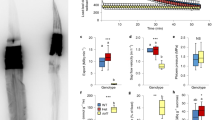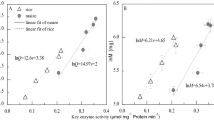Abstract
IN two earlier papers I showed that there was good evidence for postulating polar rather than transverse movement of materials in plants1a,b. This conclusion was supported by later work on the movement of fluorescein in the xylem system1c, of labelled carbon2 and of labelled phosphorus3. The two last papers describe experiments which show that carbon-14 or phosphorus-32 when introduced on one side into the leaves or the roots respectively of plants pass freely and rapidly up to the tissues on that side, but do not move transversely across the plant.
This is a preview of subscription content, access via your institution
Access options
Subscribe to this journal
Receive 51 print issues and online access
$199.00 per year
only $3.90 per issue
Buy this article
- Purchase on Springer Link
- Instant access to full article PDF
Prices may be subject to local taxes which are calculated during checkout
Similar content being viewed by others
References
Caldwell, J., (a) Proc. Roy. Soc. Edin., 50 (1929); (b) New Phytologist, 29, 1 (1930); (c) ibid., 52, 3 (1953).
Jones, H., Martin, R. V., and Porter, H. K., Ann. Bot. (N.S.), 23, 92 (1959).
Rinne, R. W., and Langston, R. C., Plant Phys., 35, 2 (1960).
Author information
Authors and Affiliations
Rights and permissions
About this article
Cite this article
CALDWELL, J. Further Evidence of Polar Movement of Nutrients in Plants. Nature 190, 1028–1029 (1961). https://doi.org/10.1038/1901028a0
Issue Date:
DOI: https://doi.org/10.1038/1901028a0
This article is cited by
Comments
By submitting a comment you agree to abide by our Terms and Community Guidelines. If you find something abusive or that does not comply with our terms or guidelines please flag it as inappropriate.



